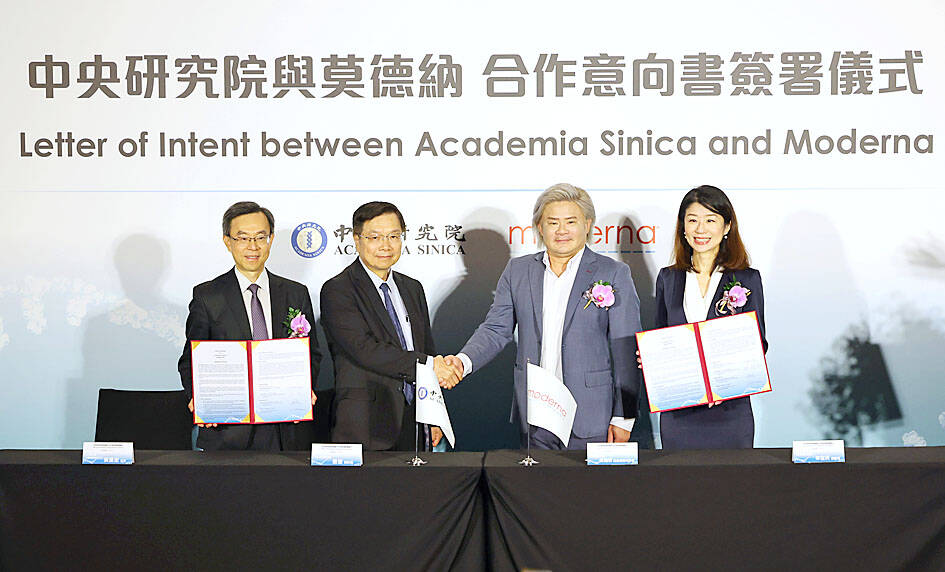Academia Sinica and vaccine developer Moderna Inc yesterday announced a five-year strategic partnership to jointly develop messenger ribonucleic acid (mRNA) technology and cultivate research talent in Taiwan.
A letter of intent signed by the two parties includes plans to establish an mRNA technology and vaccine research and development (R&D) platform where start-ups can demonstrate their products and conduct exchanges, Academia Sinica said in a press release.
The partnership’s first venture will be an mRNA innovation awards program to select five research teams or individuals, with Moderna providing winners a cash prize of NT$500,000 (US$16,265) and guidance from the company’s experts, Moderna Taiwan general manager Joyce Lee (李宜真) said.

Photo: CNA
Applicants can submit proposals in any of the following five areas — infectious diseases, rare diseases, immuno-oncology, cardiovascular diseases and autoimmune diseases — from Friday next week to the end of next month.
Through cooperation with Academia Sinica, Moderna Taiwan hopes that more mRNA research would be conducted to explore more possibilities of mRNA applications and find innovative solutions to the healthcare challenges facing the world, while developing technology to improve disease prevention and clinical treatment, Lee said.
Taiwan is the only Asian country where Moderna is conducting clinical trials for its flu vaccine, she said.
Moderna Taiwan hopes to bring the most effective medicines and vaccines to Asia, and become a talent incubation hub in the region in preparation for the next pandemic, she added.
Academia Sinica vice president Tang Tang (唐堂) said that the research academy formed its first mRNA vaccine research and development team at the end of 2020, using its mRNA pilot research facility to develop vaccine candidates for early clinical trials.
On-site verification of the mRNA pilot research facility is expected to be completed by the end of this year and start a small-scale trial production trial by the industry and academia next year, Tang added.
Tang said that Academia Sinica’s Biomedical Translation Research Center, which is part of the National Biotechnology Research Park, has helped 59 companies, including 13 publicly listed companies, with a total market value of about NT$350 billion, accounting for 29 percent of the total market value of the biomedical industry in Taiwan.

The US dollar was trading at NT$29.7 at 10am today on the Taipei Foreign Exchange, as the New Taiwan dollar gained NT$1.364 from the previous close last week. The NT dollar continued to rise today, after surging 3.07 percent on Friday. After opening at NT$30.91, the NT dollar gained more than NT$1 in just 15 minutes, briefly passing the NT$30 mark. Before the US Department of the Treasury's semi-annual currency report came out, expectations that the NT dollar would keep rising were already building. The NT dollar on Friday closed at NT$31.064, up by NT$0.953 — a 3.07 percent single-day gain. Today,

‘SHORT TERM’: The local currency would likely remain strong in the near term, driven by anticipated US trade pressure, capital inflows and expectations of a US Fed rate cut The US dollar is expected to fall below NT$30 in the near term, as traders anticipate increased pressure from Washington for Taiwan to allow the New Taiwan dollar to appreciate, Cathay United Bank (國泰世華銀行) chief economist Lin Chi-chao (林啟超) said. Following a sharp drop in the greenback against the NT dollar on Friday, Lin told the Central News Agency that the local currency is likely to remain strong in the short term, driven in part by market psychology surrounding anticipated US policy pressure. On Friday, the US dollar fell NT$0.953, or 3.07 percent, closing at NT$31.064 — its lowest level since Jan.

Hong Kong authorities ramped up sales of the local dollar as the greenback’s slide threatened the foreign-exchange peg. The Hong Kong Monetary Authority (HKMA) sold a record HK$60.5 billion (US$7.8 billion) of the city’s currency, according to an alert sent on its Bloomberg page yesterday in Asia, after it tested the upper end of its trading band. That added to the HK$56.1 billion of sales versus the greenback since Friday. The rapid intervention signals efforts from the city’s authorities to limit the local currency’s moves within its HK$7.75 to HK$7.85 per US dollar trading band. Heavy sales of the local dollar by

The Financial Supervisory Commission (FSC) yesterday met with some of the nation’s largest insurance companies as a skyrocketing New Taiwan dollar piles pressure on their hundreds of billions of dollars in US bond investments. The commission has asked some life insurance firms, among the biggest Asian holders of US debt, to discuss how the rapidly strengthening NT dollar has impacted their operations, people familiar with the matter said. The meeting took place as the NT dollar jumped as much as 5 percent yesterday, its biggest intraday gain in more than three decades. The local currency surged as exporters rushed to